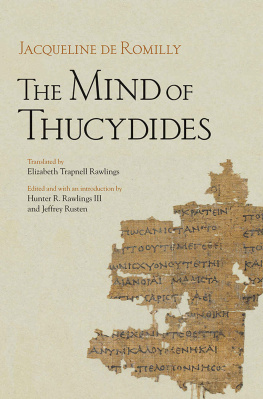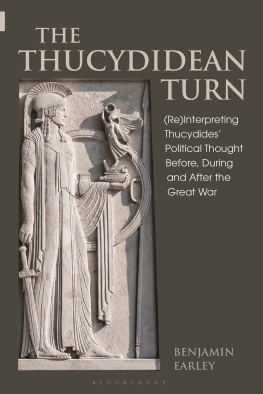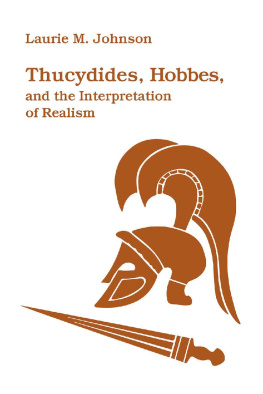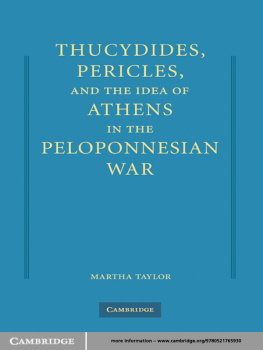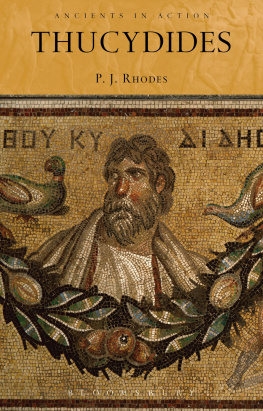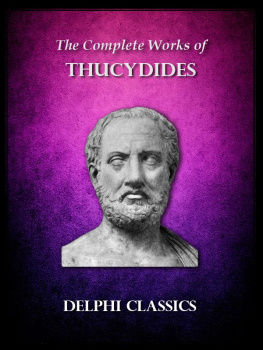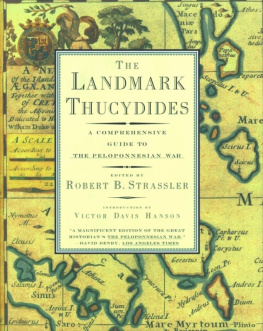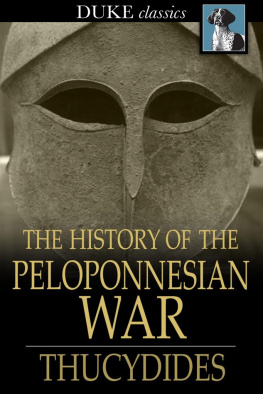T HE M IND OF T HUCYDIDES
J ACQUELINE DE R OMILLY
T RANSLATED BY E LIZABETH T RAPNELL R AWLINGS
E DITED AND WITH AN INTRODUCTION BY
H UNTER R. R AWLINGS III AND
J EFFREY S. R USTEN
C ORNELL U NIVERSITY P RESS
I THACA AND L ONDON
C ONTENTS
E DITORS AND T RANSLATOR S P REFACE
Jacqueline de Romillys Histoire et raison chez Thucydide turned the modern study of Greeces most admired historian upside down, focusing not on what he thought but how he thought, and particularly on the unique consistency and rigor with which he set forth the account of his war. This work, published to great acclaim in 1956, marked the start of a career of expounding the greatness of ancient Greek thought that took Romilly to the Sorbonne in 1957, the Collge de France in 1973, and the Acadmie Franaise in 1989.
Histoire et raison remains in print more than fifty years later, and we are certainly not the first to wonder why it has never been translated into English to make its insights available to readers of Thucydides at every level. It seemed particularly appropriate that the initiative be taken by Cornell University, where Romilly delivered the Messenger Lectures in 1967 ( Time in Greek Tragedy [Ithaca, NY: Cornell University Press, 1968]) and was A. D. White Professor-at-Large in 197480. The editors and translator conceived this project together, with the enthusiastic support of Peter Potter, editor in chief of Cornell University Press, and Charles Brittain and Hayden Pelliccia, chairs of the Classics Department at Cornell.
All three of us have worked together from the start. Elizabeth Rawlings prepared the translation of the French in consultation with Hunter Rawlings, Jeffrey Rusten added and translated the Greek and provided fuller references to ancient texts and a bibliography, and both Hunter and Jeffrey revised the translation extensively with the Hellenist reader in mind. We were pleased that Pietro Pucci and Jeannine Routier-Pucci, longtime friends of the author, could advise us on some remaining uncertainties. Cynthia King and Marian Hartman Rogers made numerous corrections to the final manuscript. Jake Nabel prepared the indexes.
We have not attempted to update the bibliography or notes, since the books sense of discovery and its cogency seemed to us in no way dated or altered by subsequent work. Readers interested in later scholarship on any part of Thucydides are urged to consult Simon Hornblower, A Commentary on Thucydides , 3 vols. (New York: Oxford University Press, 19912009), or the systematic bibliography in Jeffrey Rusten, ed., Thucydides , Oxford Readings in Classical Studies (Oxford and New York: Oxford University Press, 2009). Romillys many subsequent writings on Thucydides, building on and extending the method presented here, have been helpfully collected with a preface by Monique Trd in Linvention de lhistoire politique chez Thucydide (Paris: Rue dUlm Presses de lcole Normale Suprieure, 2005).
Elizabeth Trapnell Rawlings
Hunter R. Rawlings III
Jeffrey S. Rusten
E DITORS I NTRODUCTION
Thucydides was the first prose author in the West to compose a work consciously designed for close reading. He makes this intent clear in his preface, 1.2122, where he criticizes his predecessors for their superficial appeal to immediate listening pleasure and proclaims his own history a permanent image of reality that requires and repays active and repeated scrutiny: It is possible that for reading, the lack of traditional stories in my narrative will seem rather unappealing; but if those who will want to study the truth of what happened and is going to happen again in similar or related form according to the human condition judge my account useful, I shall be content. For it has been composed as a permanent acquisition to be read repeatedly, rather than as a popular piece to be read just once. Jacqueline de Romilly heeded Thucydides explicit call for close reading and first uncovered the principles of his historiographical composition. This was the contribution made by the publication in 1956 of her Histoire et raison chez Thucydides , a book that set Thucydidean scholarship on a new and productive path still followed today, over a half century later.
Romillys achievement is especially striking when one considers the entrenched position of the two schools of thought then dominating Thucydidean studies. When she published Histoire et raison, Die Kompositionsfrage had absorbed German scholarship on Thucydides for over a century. In the tradition of the higher criticism that began with the Bible and moved to Homer in the eighteenth century, F. W. Ullrich introduced the separatist analysis of Thucydides text in 1846, with the publication of his Beitrge zur Erklrung des Thukydides. From that point on, German scholars employed the analytical tools developed in biblical and Homeric criticism to deconstruct the text of Thucydidesthat is, to uncover the different stages in which Thucydides was supposed to have composed discrete sections of his work. British scholars followed, and by the early decades of the twentieth century almost every classicist working on Thucydides had to declare whether he was a separatist or unitarian: is the work a pastiche of passages that reveals the authors changing points of view over the course of a long war, or is it a text unified by a single vision and plan?
The other major school of Thucydidean studies, centered at Oxford, was almost exclusively historical. This approach correctly saw Thucydides History as the major source of eyewitness and documentary evidence for the Peloponnesian War and for Athenian political and military conduct in the second half of the fifth century B.C.E. Oxford historians made great progress in unveiling the inner workings of the Athenian Empire, partly through close investigation of Thucydides narrative, partly through expert study of Athenian public inscriptions. Their work culminated in a major epigraphical achievement, The Athenian Tribute Lists (four volumes published between 1939 and 1953), and in a superb work of scholarship, A Historical Commentary on Thucydides, whose first volume was published in 1945. This commentary, eventually extending to three authors and five volumes, the last of which did not appear until 1981, became the principal aid for all scholars of Thucydides to consult, no matter what their interest in the historian might be. The work has numerous virtues, but, as the title suggests, it neglects the power and sophistication of Thucydides rhetoric and, for the most part, ignores his literary artistry. As an indication of how the two dominant approaches to Thucydidean studies merged, the final volume of A Historical Commentary contains a sixty-page appendix titled Strata of Composition.
Enter Madame de Romilly. In her earlier book on Thucydides (Romilly 1963, 7; originally published in 1947), she gave Die Kompositionsfrage a fitting epitaph: Exhausting by the immense bibliography which it offers, completely negative in its results, the question of the composition of the work can at present be considered as the perfect example of a vain and insoluble problem. Rather than mining the text for clues to its layers of composition, or for its disclosure of historical data, she treated The Peloponnesian War as a work of art deserving rhetorical and aesthetic analysis, confident that a literary approach to Thucydides offered a more productive and nuanced way to study the text.
It is telling that Romilly begins the introduction to Histoire et raison with the words La lecture de loeuvre de Thucydide revle immediatement des particularits de forme assez remarquables, and then proceeds to speak of the works exceptional art. Form and art are the subjects of this book, and like the historian himself, Romilly never strays from her focus on her subject, nor does she relax the rigor with which she examines it. This is why she is, in a sense, the first person fully to carry out the project Thucydides asked his readers to conduct, though she benefited from the findings of two other scholars in particular, J. H. Finley and Louis Bodin. In a well-argued paper entitled The Unity of Thucydides History, first published in 1940 ( HSCP Suppl. 1) and later reprinted in his Three Essays on Thucydides (Cambridge, MA: Harvard University Press, 1967), Finley made the case that the work evinces a unified artistic conception replete with major and minor themes and a consistent literary structure. Romilly dedicated Histoire et raison to the memory of Bodin, her collaborator on Thucydidean studies who so inspired this book that she calls him to some extent its author. Bodin had conceived a major analysis of Thucydides compositional method but did not live to publish it. He left his preparatory notes to Romilly, and she warmly acknowledges her debt to his ideas and to his collegiality.
Next page
